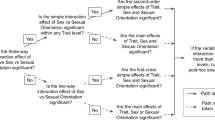Abstract
A predominately European American sample of 197 middle-class college students rated married women and men with hyphenated surnames on the Big Five personality factors (R. Lippa, 1991), the Personal Attributes Questionnaire (J. T. Spence & R. L. Helmreich, 1978), the adjectives “masculine” and “feminine,” and 12 adjective phrases reflecting different aspects of marriage. Both men and women perceived women and men with hyphenated last names as different from other married people. In comparison with the average married woman, the woman with a hyphenated name was perceived as more friendly, good-natured, industrious, and intellectually curious. She was also perceived as well educated and as more likely to have a career. Men with hyphenated surnames were also perceived as accommodating and good-natured, and viewed as being both nurturing and committed to their marriage. Women and men with hyphenated names were generally perceived as having higher levels of both instrumental and expressive traits than other married people. Women appear to have more positive perceptions than men, particularly of the man with a hyphenated name. The results suggest that college students have generally positive perceptions of married people with hyphenated names.
Similar content being viewed by others
REFERENCES
Bem, S. L. (1981). Gender schema theory: A cognitive account of sex typing. Psychological Review, 88, 354-364.
Brightman, J. (1994, March). Why did Hillary choose Rodham Clinton. American Demographics, 16, 9.
Digman, J. M. (1990). Personality structure: Emergence of the five-factor model. In M. Rosenzweig & L. W. Porter (Eds.), Annual Review of Psychology (Vol. 41, pp. 417-440). Palo Alto, CA: Annual Reviews.
Dion, K. L. (1987). What's in a title? The Ms. Stereotype and images of women's titles of address. Psychology of Women Quarterly, 11, 21-36.
Dion, K. L., & Cota, A. A. (1991). The Ms. Stereotype: Its domain and the role of explicitness in title preference. Psychology of Women Quarterly, 15, 403-410.
Dion, K. L, & Schuller, R. A. (1991). The Ms. stereotype: Its generality and its relation to managerial and marital status stereo-types. Canadian Journal of Behavioural Sciences, 23, 25-40.
Dralle, P. W., & Mackiewicz, K. (1981). Psychological impact of women's name change at marriage: Literature review and implications for further study. American Journal of Family Therapy, 9, 50-55.
Etaugh, C. E., Bridges, J. S., Cummings-Hill, M., & Cohen, J. (1999). “Names can never hurt me?” The effects of surname use on perceptions of married women. Psychology of Women Quarterly, 23, 819-823.
Foss, K. A., & Edson, B. A. (1989). What's in a name? Accounts of married women's name choices. Western Journal of Speech Communication, 53, 356-373.
Funder, D. C. (1992). Global traits: A neo-Allportian approach to personality. Psychological Science, 2, 31-39.
Glick, P., & Fiske, S. T. (1996). The Ambivalent Sexism Inventory: Differentiating hostile and benevolent sexism. Journal of Personality and Social Psychology, 70, 491-512.
Glick, P., & Fiske, S. T. (1997). Hostile and benevolent sexism: Measuring ambivalent sexist attitudes toward women. Psychology of Women Quarterly, 21, 119-135.
Glick, P., & Fiske, S. T. (1999). The Ambivalence Toward Men Inventory: Differentiating hostile and benevolent beliefs about men. Psychology of Women Quarterly, 23, 519-536.
Glick, P., & Fiske, S. T. (2001). An ambivalent alliance: Hostile and benevolent sexism as complementary justifications for gender inequality. American Psychologist, 56, 109-118.
Holm, S. (1979). A simple sequentially rejective multiple test procedure. Scandinavian Journal of Statistics, 6, 65-70.
Helms, A. D. (2001, July 3). Whose name is it, anyway? Married couples improvise hyphenated and otherwise. Charlotte Observer, p. 8.
Johnson, D. R., & Scheuble, L. K. (1995). Women's marital naming in two generations: A national study. Journal of Marriage and Family, 57, 724-732.
Kline, S. L., Stafford, L., & Miklosovic, J. C. (1996). Women's surnames: Decisions, interpretations and associations with relational qualities. Journal of Social and Personal Relationships, 13, 593-617.
Lippa, R. (1991). Some psychometric characteristics of gender diagnosticity measures: Reliability, validity, consistency across domains, and relationship to the Big Five. Journal of Personality and Social Psychology, 61, 1000-1011.
Scheuble, L., & Johnson, D. R. (1993). Marital name change: Plans and attitudes of college students. Journal of Marriage and Family, 55, 747-754.
Schultz, E. A., & Lavenda, R. H. (1995). Anthropology: A perspective on the human condition. Mountain View, CA: Mayfield.
Spence, J. T., & Buckner, C. (1995). Masculinity and femininity: Defining the undefinable. In P. J. Kalbfleisch & M. J. Cody (Eds.), Gender, power and communication in human relationships (pp. 105-138). Hillsdale, NJ: Erlbaum.
Spence, J. T., & Buckner, C. E. (2000). Instrumental and expressive traits, trait stereotypes, and sexist attitudes: What do they signify? Psychology of Women Quarterly, 24, 44-62.
Spence, J. T., & Helmreich, R. L. (1978). Masculinity and femininity: Their psychological dimensions, correlates, and antecedents. Austin, TX: University of Texas Press.
Stannard, U. (1977). Mrs. Man. San Francisco: Germainbooks.
Twenge, J. M. (1997). “Mrs. His Name”: Women's preferences for married names. Psychology of Women Quarterly, 21, 417-429.
Author information
Authors and Affiliations
Rights and permissions
About this article
Cite this article
Forbes, G.B., Adams-Curtis, L.E., White, K.B. et al. Perceptions of Married Women and Married Men with Hyphenated Surnames. Sex Roles 46, 167–175 (2002). https://doi.org/10.1023/A:1019613819247
Issue Date:
DOI: https://doi.org/10.1023/A:1019613819247




